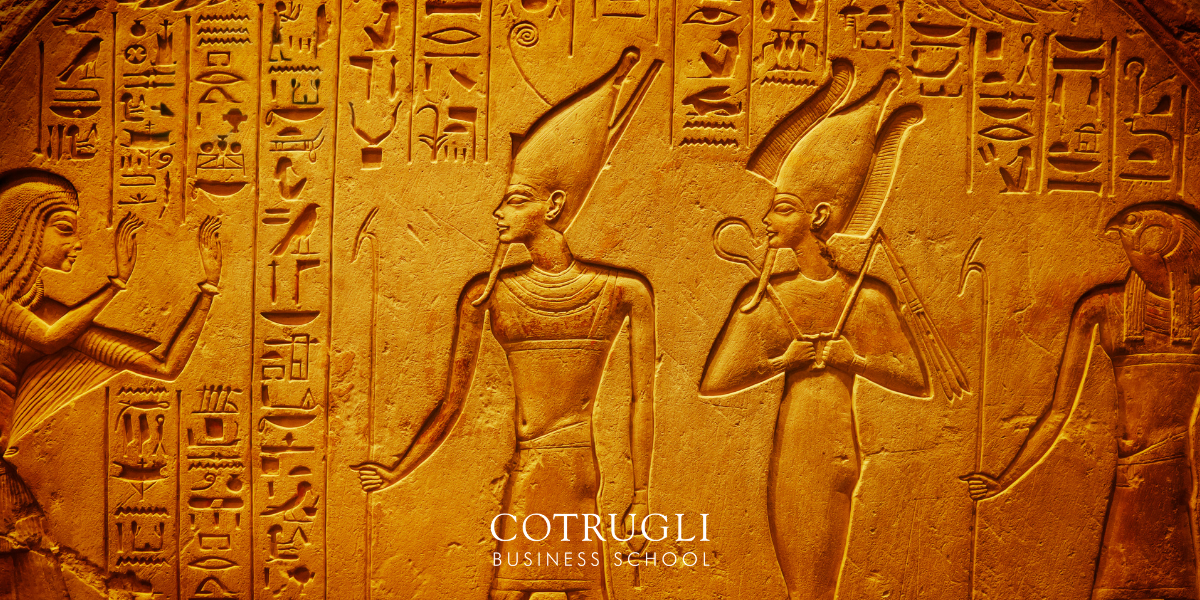The Economy of Ancient Egypt
Agriculture was the base of Ancient Egypt’s wealth. The most important economic event in ancient Egypt was the annual flooding of the Nile floodplain which determined whether the harvest will be abundant or scarce. The Nile was also a communication artery of the kingdom that supported the functioning of the economy.
Situated along the River Nile and protected by wide deserts the ancient Egypt enjoyed prosperity and continuity for almost three thousand years ─ from its unification around 3100 BC to the Roman conquest in 31 BC.
Command economy
Ancient Egypt was run as a theocratic monarchy which meant that all living and nonliving in Egypt were considered the ownership of the divine Pharaoh. The form of economy pursued was known as the “palace” or “command” economy in which the crucial role belonged to the Pharaoh and his loyal bureaucratic network of scribes, nobles, and priests.
Economic activities of major importance for the state like agriculture, mining, manufacture of luxury, and foreign trade were strictly supervised and financed by the Pharaoh.
Taxes
The main source of Pharaoh’s revenues was taxes paid in the form of grain and labor for state projects and the military. The tax imposed on farmers was equal to about 10 to 20 percent of the annual harvest.
During years of drought and bad harvest, the Egyptian rulers remitted their subjects of taxes to enable them to recuperate. The name of this practice called “philanthropa” is the word from which word “philanthropy” derives.
Public and private
As the main sponsor of international trade and large-scale ventures, the Pharaoh left little space for the rise of private entrepreneurship and financial innovations to support business. This was the reason why the class of private businessmen never developed in Egypt to the extent as in other contemporary civilizations where individual initiative was tolerated and fostered.
The social position of women was especially advantageous in Egyptian society and determined by rank and not gender. The Egyptian women were allowed to participate in the business, they enjoyed legal rights, and most importantly, they were paid equally for equal work as men which is advanced even in today’s terms.
In Ancient Egypt was recorded the oldest strike in world history for better working conditions. It took place in the 12th century BC in Deir el Medina during the reign of Ramses III – and, what matters, it ended successfully.
Trade expeditions
Convinced of the superiority of their civilization the Egyptian relations with other countries like Mesopotamia, Lebanon, Greece, and the mystical land Punt in the Red Sea did not go beyond the trade exchange. They also founded colonies in Nubia, Syria, and Palestine for economic reasons – as a base for mining expeditions and trade, and as a foothold to enhance their political power. The main Egyptian exports were grain, gold, and manufactured items produced by craftsmen employed in state or temple workshops such as papyrus, pottery, linen, and luxury goods which were exchanged for wood, metal (silver and copper), oils, and luxury items such as spices, glass, ivory, lapis lazuli and the animal skins that Egypt lacked.
Papyrus after which paper is called was among the main Egyptian export products and the most common writing material throughout the ancient world. Perfumes were also a valuable export commodity and the Egyptians were known as masters of the art of perfumes.
Monetary system
Despite the wealth the classical coins were not used in ancient Egypt until around 500 BC. In commercial life prevailed bartering and to set the value of goods and services for bartering they used “deben”. Deben was the unit of weight that corresponded to 91 g.
The salaries in ancient Egypt were calculated in units of bread and beer, the two basic staples in Egyptian diet. The standard basic wage was ten loaves of bread plus one-third to two full jugs of beer per day. This was the amount paid to the lowest-paid staff members.







